Endless scenic roads leading everywhere and anywhere. Every kind of landscape, from snowy mountains to aquamarine coastline. A strong culture of hospitality toward foreign visitors. Motorcycle travel in Turkey (Türkiye) is a dream every biker should experience at least once.
In my humble opinion, anyway.
At the time of writing, I’ve biked through Türkiye 4 times, both solo and with friends, including a full loop around the country. I’ve boiled, frozen, quaked, quivered, and everything between… and still, I could go back for more! Turkey is one of those countries that never bores. If you’re considering motorcycle travel in Turkey, I say… heck yes! Go for it!
Read on for everything you need to know for your next motorcycle trip to Turkey.
Motorcycle travel in Turkey: Table of Contents
- What is it like to travel by motorcycle in Turkey?
- When is the best time of year to motorcycle in Turkey?
- Is it safe to travel by motorcycle in Turkey?
- How expensive is it to travel in Turkey by bike?
- Best places to ride motorcycles in Turkey
- Practical motorcycle travel in Turkey
- How to ride to Turkey
- Motorcycle insurance in Turkey
- How long can my motorcycle be in Turkey?
- Do I need an IDP or Carnet de Passage to ride in Turkey?
- Renting a motorcycle in Turkey
- HGS tags for toll roads in Turkey
- Speed cameras and fines in Turkey
- Motorcycle gear laws in Turkey
- Motorcycle mechanics and spare parts in Turkey
- Where to stay with your motorcycle
- Motorcycle camping in Turkey
- TET Turkey
- Emergency numbers for Turkey
- Resources for motorcycle travel in Turkey
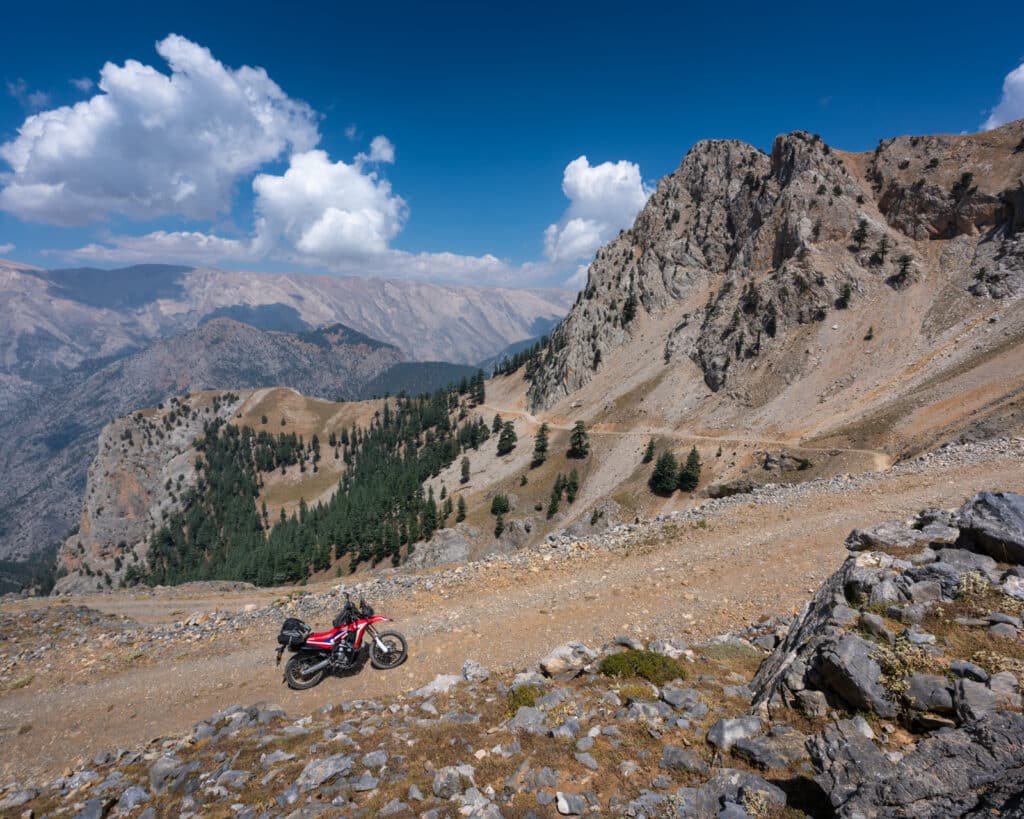
Zipping along in the mountains while following the TET Turkey during one of my visits to Türkiye
Motorcycle travel in Turkey: what is it like?
Let’s start with the basics: What is motorcycle travel in Turkey like?
As a fairly well-traveled biker, I’d say… it’s adventurous, but not necessarily strenuous. To help you understand where I’m coming from, I run motorcycle tours in Pakistan, have biked in Europe, Asia, and the Middle East, and am a solo female traveler under 40.
Roads are good; the Turkish government invested a lot of money into improving its road network, and you can find well-paved, highway-quality roads pretty much everywhere in the country. Turkish drivers can be a little wild as compared to Europe, but they’re still more tame than their neighbors further east.
Infrastructure is good as well. You won’t fret much about finding petrol. It’s easy to find motorcycle shops and workshops in big cities. Hotels and guesthouses are everywhere. And my favorite: wild camping is encouraged, rather than prohibited.
Language is the biggest barrier when traveling by motorcycle in Turkey: outside of touristy places like Istanbul, Cappadocia, and the western Mediterranean coast, English skills are rare. Luckily, people are patient and willing to put in the effort to understand you, and Google Translate works well enough for Turkish.
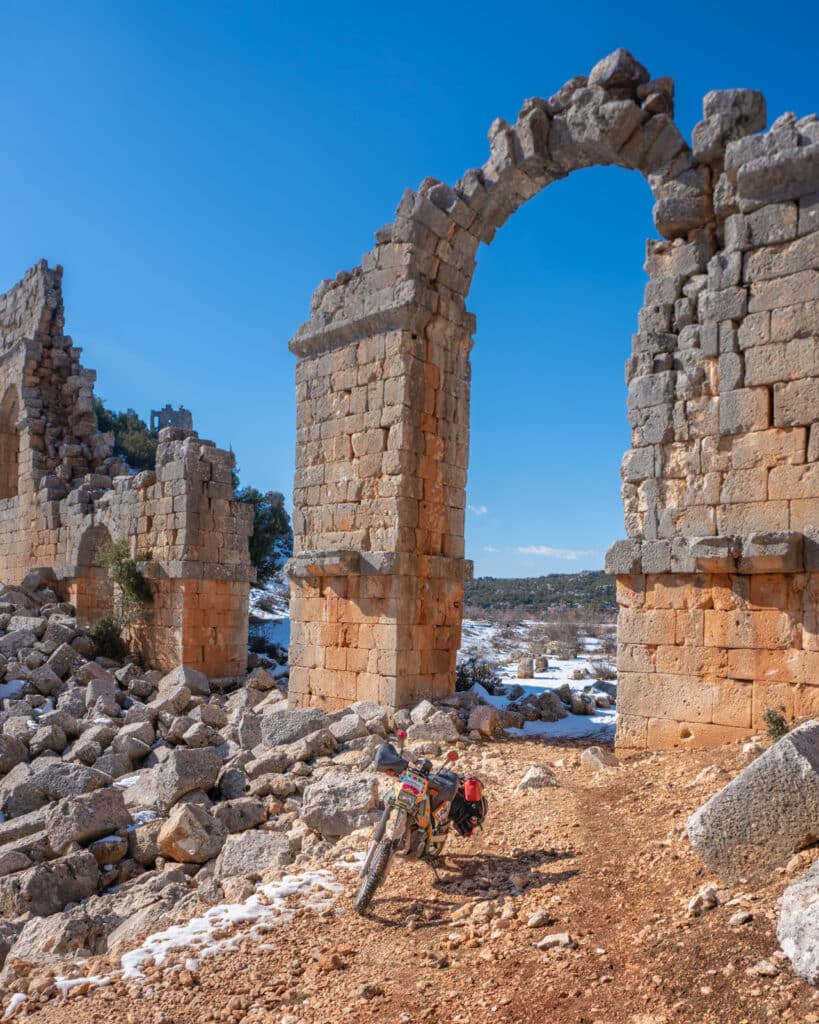
Winter motorcycle travel in Turkey: parked in the snow below casual Roman ruins.
Motorcycle travel in Turkey: when is the best time for it?
Turkey is a huge country with all kinds of landscapes. Technically, you could ride in Turkey at any time of year as long as you have the right gear!
For the best weather for your motorcycle travel in Turkey, I recommend visiting in March/April or September/October. You’ll avoid the worst summer tourism and experience more pleasant temperatures while riding. You’ll have pleasant spring/fall weather in the north, and the south won’t be too hot.
Summer motorcycle travel in Turkey (June – August) is possible… but hot. Like, really hot. Sometimes 40°C+ hot. If riding in summer, I recommend heading up to the Black Sea coast and areas east of there. They’re green, mountainous, and because of the elevation, cooler than other parts of the country.
Winter motorcycle travel in Turkey is also possible… if you don’t mind frigid cold from time to time. I’ve ridden both inland and on the Mediterranean coast in winter… and inland was not pleasant unless you like snow and biting winds. If you’re traveling to Turkey in winter to ride, stick to the southernmost Mediterranean coast for more pleasant riding weather (15-20°C on sunny days). If you’re a fan of snow, add a detour for some skiing in Erciyes, one of the country’s highest ski resorts.
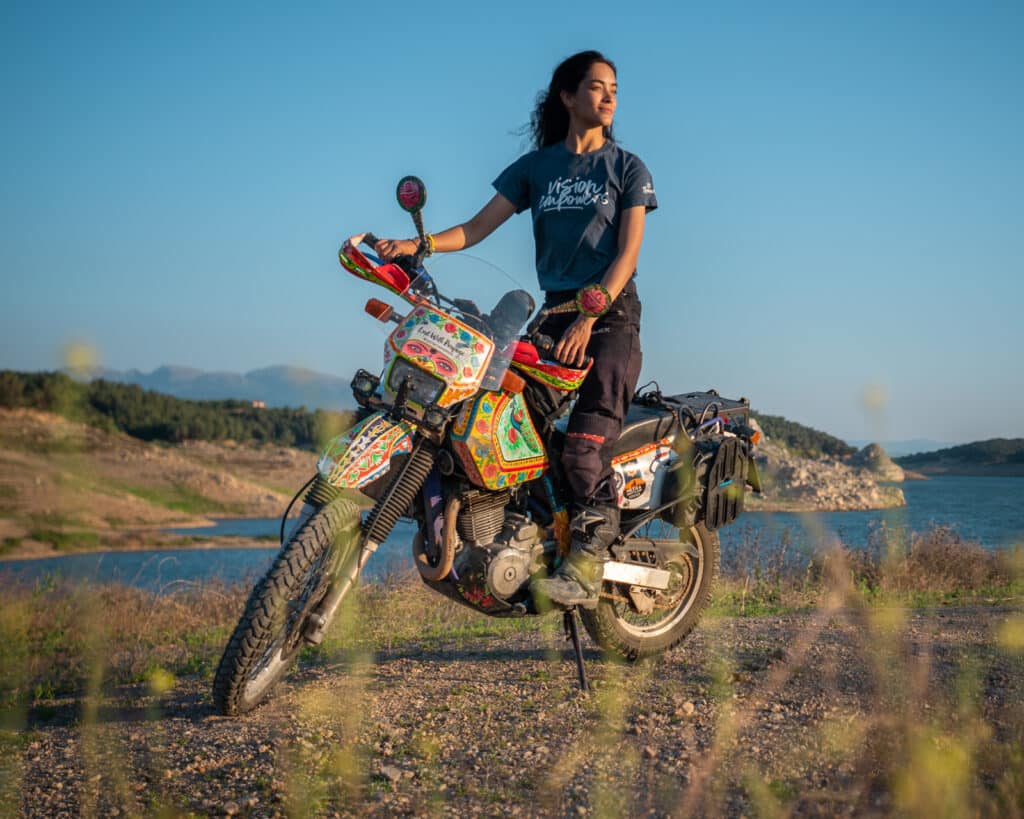
Solo female motorcycle travel in Turkey: yes, it’s possible. Here’s evidence.
Is it safe to travel by motorcycle in Turkey?
Always the question! Always with a subjective answer.
I think motorcycle travel in Turkey is safe. Enough. I say this as a thirty-something American woman who has biked thousands of kilometers solo across the country… and didn’t die.
Yes, there are still occasional attacks in the country, especially in the Kurdistan region. However, there is a lot of military presence, so you’re not likely to accidentally walk into a violent scene. Risk areas are closely monitored and often off-limits to foreign tourists.
The most dangerous part of motorcycle travel in Turkey is probably… riding! Turkish drivers don’t always follow rules, and are prone to sudden maneuvers. Drive defensively, don’t do anything reckless, and you’ll be fine. Motorcycling is dangerous no matter where you are in the world.
Is it safe for women to solo travel by motorcycle in Turkey?
Solo female travel is a bit of a different story, as always. However, I felt comfortable traveling solo in Turkey on motorcycle. Let it be noted that I’ve traveled by motorcycle in a lot more “challenging” places like Iraq and Saudi Arabia, so Turkey is a bit more relaxed than what I’m used to.
Most men were intimidated by the motorcycle and bike gear. Others were extremely impressed and enthusiastic to see a girl riding alone. Families were extra supportive and protective because I was alone. In some more conservative areas, yes, I received some dubious looks from people who didn’t think much about a woman traveling alone on bike. Nothing more than that, though.
I had to deal with the occasional unwanted advances from men. I took precautions, like not drinking if alone with a group of men. But as all of us ladies know: sh*t can happen anywhere, and men are creeps all around the world. For the most part, I felt supported and accepted while traveling as a solo female on motorcycle in Turkey.
Also read: Trust as a solo female traveler – my creep radar, explained
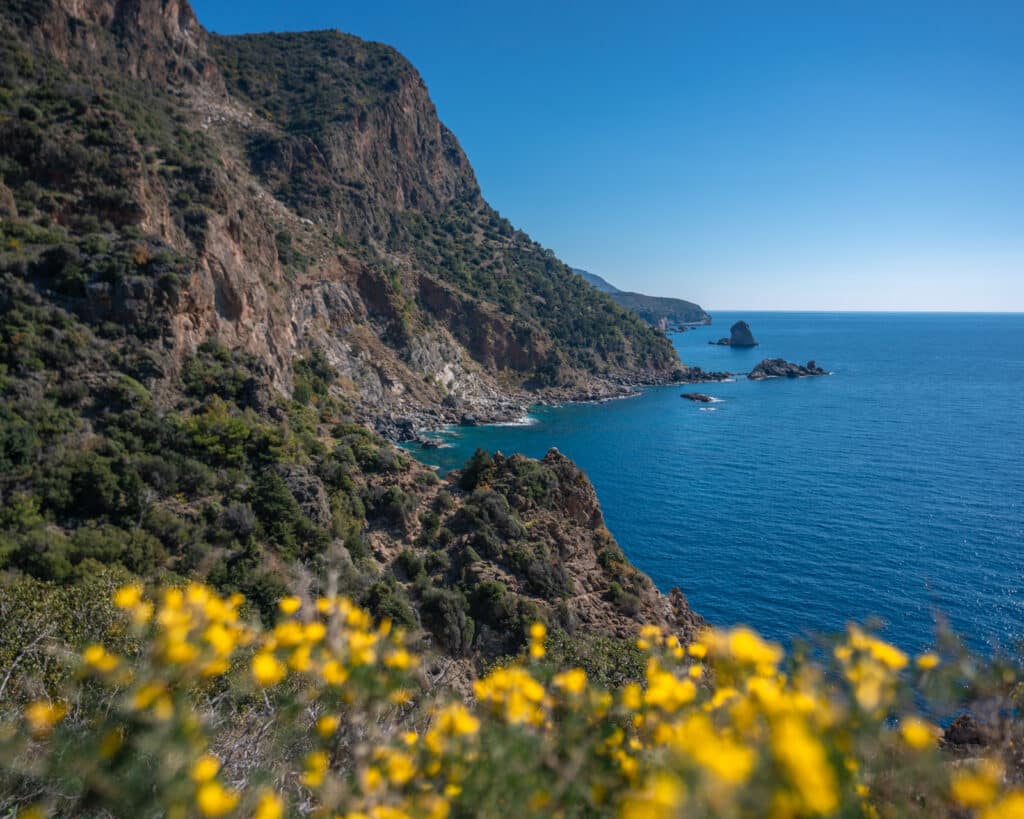
Motorcycle travel in Turkey is more expensive if following the Mediterranean coast, especially during high seasons.
How expensive is motorcycle travel in Turkey?
If you earned in a powerful Western currency (ex. Dollars, euros), Turkey used to be a cheap country to travel in.
These days, prices have skyrocketed in many places, and motorcycle travel in Turkey isn’t much cheaper than in neighboring European countries. I would compare the cost of motorcycle travel in Turkey to costs in Central or Southern Europe.
When I was last there in summer of 2023, petrol was around $1.25-$1.50 per liter—not much cheaper than Europe. A cheap hotel room was at least $25/night. Feeding yourself for a day could be $5-10 if eating fast food or buying groceries, double or triple that if eating at restaurants.
That being said, aside from petrol expenses, it’s possible to save a lot of money by only camping, avoiding toll roads, and cooking your own food. If you’re white, to be honest, people will probably be gifting you food and tea everywhere you go once you get out of the tourist areas.
Motorcycle travel in Turkey is cheaper than a motorcycle holiday in the Alps, sure, but not as cheap as it was several years ago or in neighboring Balkan countries. Plan accordingly.
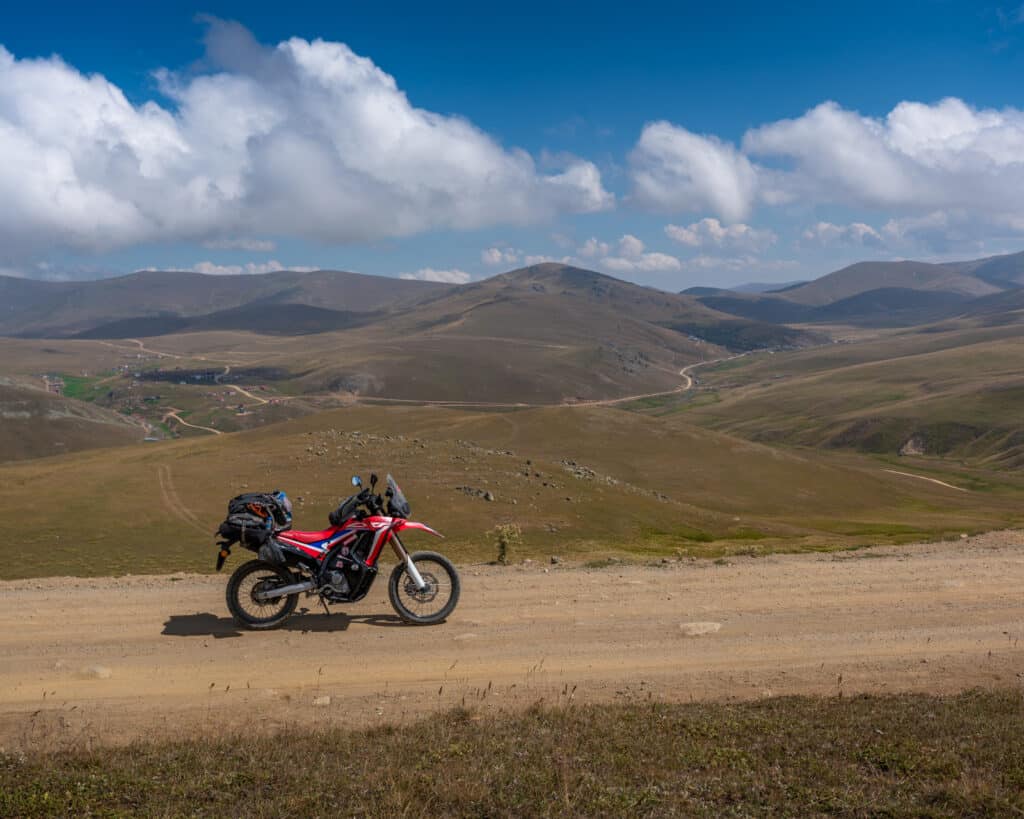
The rolling green hills of the Rize highlands were one of my favorite places to ride during my motorcycle travel in Turkey
Best places to ride motorcycles in Turkey (Türkiye)
Trying to decide where to ride during your motorcycle travel in Turkey?
Yeah, that’s a tough decision. Ideally everywhere, but no one has time for that!
Every region of Turkey has its pros and cons. All of them are beautiful. How about I break things down for you based on what you’re looking for?
Mediterranean coast: Good weather, beautiful riding, easy travel, more touristy
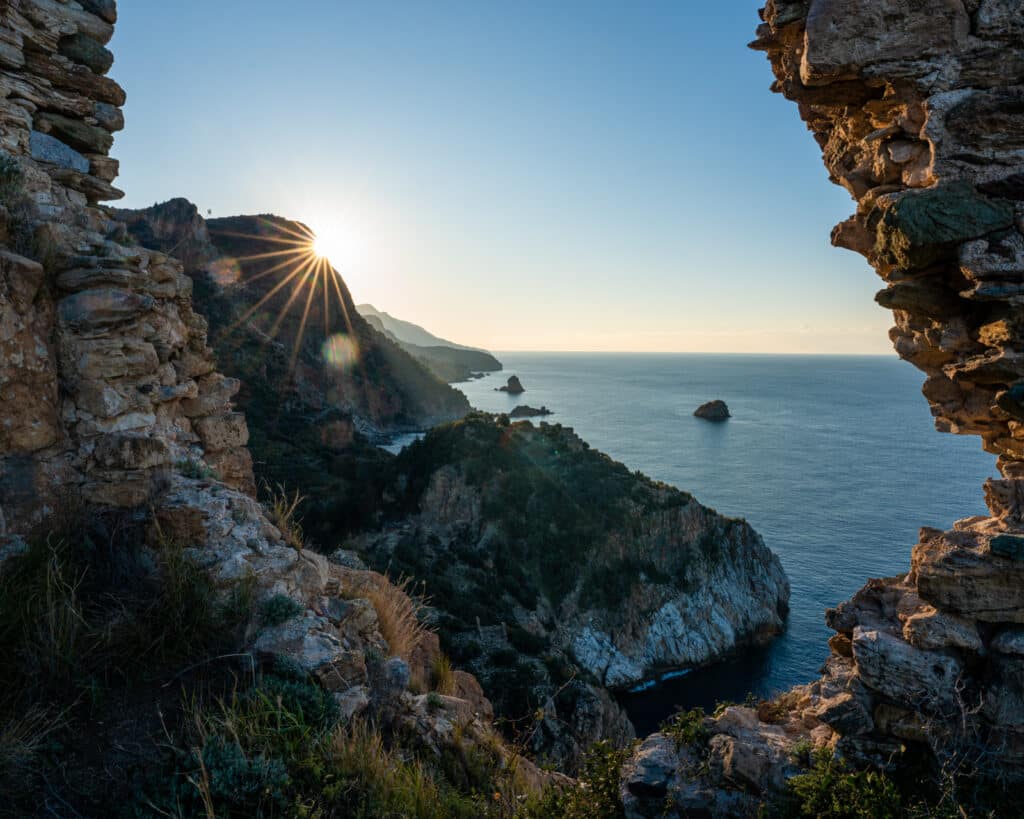
There’s no denying the beauty of Turkey’s Mediterranean coastline.
Turkey’s Mediterranean coast is the easiest riding destination in Turkey. Hotels are easy to find, more people speak English compared to other parts of Turkey, and the coastal highway is spectacular! Think green mountains snug up against the bright blue hues of the Mediterranean, with Roman ruins every which way you look. North to south, south to north, it doesn’t matter; just make sure to stop in some cute coastal villages between the bigger resort cities.
The only downside: Turkey’s Mediterranean coast is super touristed and the coastal highway can get busy.
Black Sea region: Cooler temperatures, green mountains, quiet nature, twisty roads
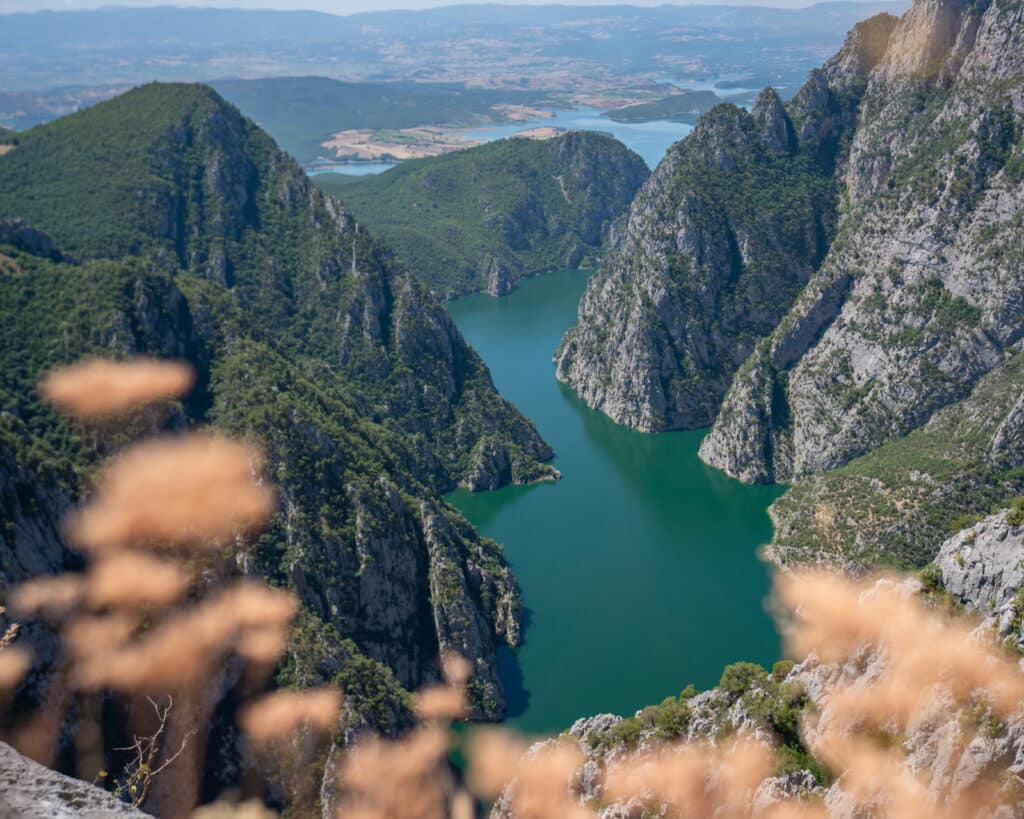
A trekker’s delight: Sahinkaya Canyon on the Black Sea coast
The Black Sea region is a popular destination for Turkish tourists looking to escape the heat in summer. Misty green mountains overlook the chilled waters of the Black Sea. You can opt to wind your way up mountain switchbacks to forests and high plains, or cruise along the highway following the Black Sea’s coast. Both are beautiful and in this region, you can have both!
Central Turkey: Cappadocia, high mountains, cultural experiences
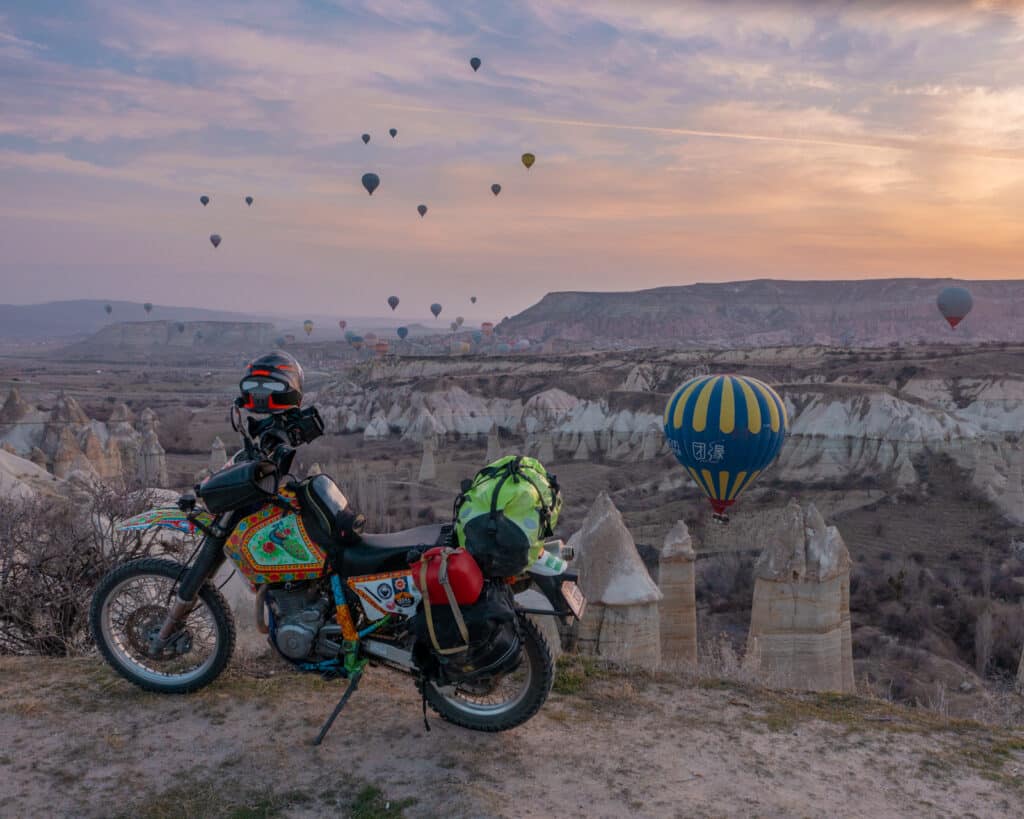
The quintessential Cappadocia experience: sunrise, hot air balloons, and… bikes!
Central Turkey is a different world from the coastal regions; it’s more religious, more quiet, and more remote in feel. Cappadocia, everyone’s famous spires-and-hot-air-balloons-bonanza, is the main highlight, but there are plenty of other places to visit. Erciyes, Turkey’s volcanic ski resort, offers stunning mountain scenery, while Konya is the heartland of Sufism in Turkey.
Kurdistan in the South and East: Friendly people, off-the-beaten-track sites, small villages
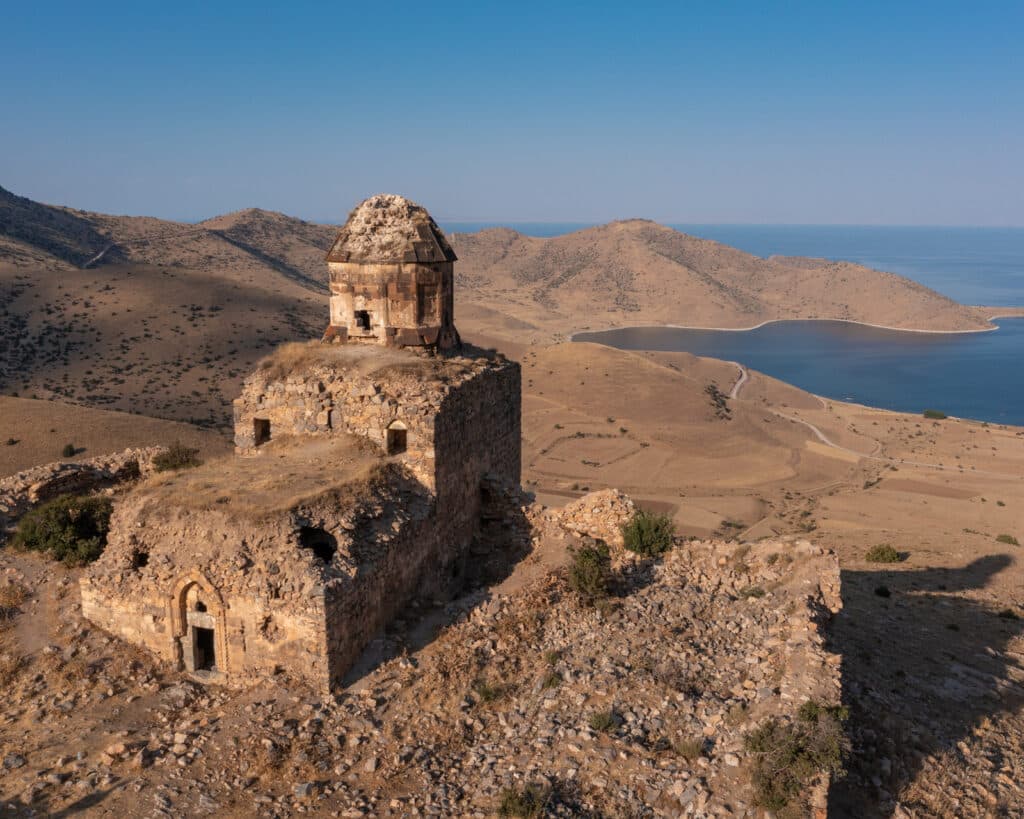
An abandoned Armenian church on Lake Van
Kurdistan is my favorite region to ride through, simply because of the people. Kurdish people, despite their negative local reputation, were the friendliest I met in Turkey! Everyone was always happy to say hello, insisted I sit down for tea, and showered me with food for the road.
In this region, you can also find all kinds of abandoned Armenian Churches, ruins of ancient cities like Gobekliteppe, and ride around mountains without a soul in sight.
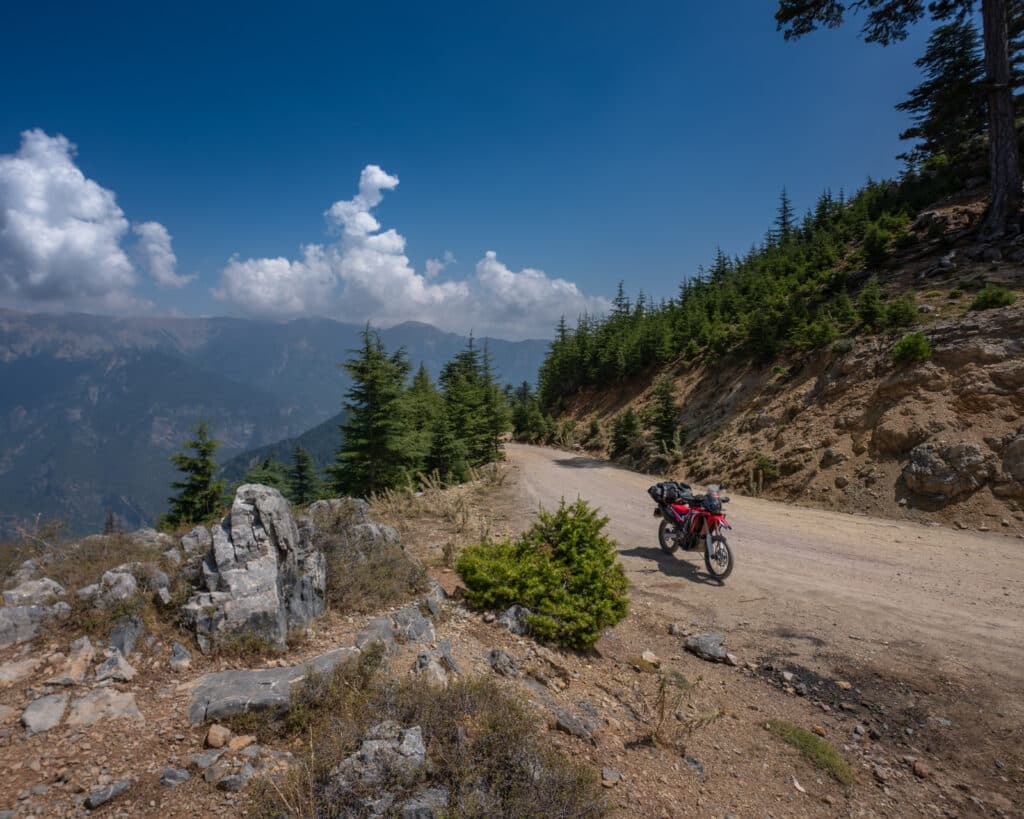
One of the joys of motorcycle travel in Turkey: stunning dirt roads all over the country
Practical motorcycle travel in Turkey
How to ride to Turkey on your own motorcycle
Traveling on your own motorcycle to Turkey? There’s no shortage of ways to enter the country!
Ride into Turkey by land – Greece, Bulgaria, Georgia, Iran, Iraq
There are multiple land border crossings with Turkey and all of its neighboring countries, except for Armenia and Syria. I’ve personally crossed the borders with Iraq and Bulgaria; both were uneventful.
Most of the border crossings are straightforward. All you need is your passport, a valid Turkish visa (if necessary), motorcycle insurance, and your motorcycle registration document. Most of the time is spent waiting to process documents and make sure your vehicle registration is valid.
You don’t have to pay any fees to enter Turkey by land. If exiting by land on your own motorcycle, you’ll have to pay any fines you built up at the border. More on that later.
Ride to Turkey by sea ferry – Greece, Ukraine
Yes, it’s possible to enter Turkey by sea with your motorcycle! The Greek islands of Chios and Kos are connected to Turkey by car ferry, and Ukraine currently has a ferry line running trips between Odessa and Karasu, just east of Istanbul. Ferry trips are less frequent in winter, while in summer, ferries between Greece and Turkey run daily. Note that not all ferries accept vehicles, so be careful to book one that does when booking your ferry tickets. Easily book your Greece-Turkey ferry tickets on ferryhopper.com.
Can you buy motorcycle insurance at the border in Turkey?
Motorcycle insurance is essential in Turkey; they won’t let you past immigration without it!
Generally, you can buy third-party motorcycle insurance at land borders in Turkey. If coming by sea, it’s better to arrange insurance ahead of time. Some more obscure land borders might be problematic for buying insurance; check for border crossing reports or check-ins on apps like iOverlander to figure out if it’s possible to buy motorcycle insurance at small border crossings in Turkey.
Note that if you have a European motorcycle many green card insurances cover Turkey already. Check to see if yours does; if not, you’ll have to buy insurance at the border.
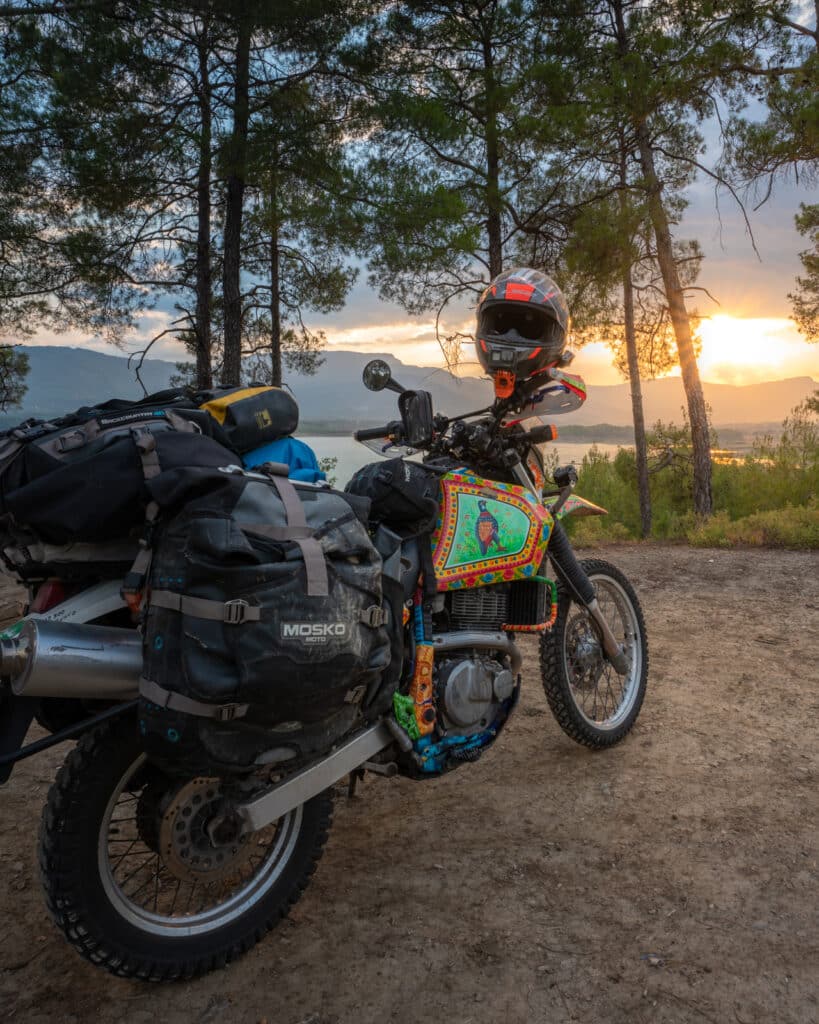
My beloved DR650 stayed in Turkey for more than 5 months, though I wasn’t there the whole time.
How long can my motorcycle be in Turkey?
Bringing your own motorcycle to Turkey? Make sure you don’t overstay!
Foreign vehicles are allowed to be in Turkey for up to 3 months; that extends to 2 years if you have a valid Turkish residency permit.
If your motorcycle overstays these 3 months you have to pay a fine of approximately US$50 per month of overstay… which increases to thousands if you overstay for more than 3 months. Don’t do it.
Can I leave my motorcycle in Turkey and go somewhere else?
If you need to go home/elsewhere and leave your motorcycle in Turkey while you’re gone, you need to inform customs. It’s a relatively straightforward process: you simply go and declare your departure to customs, get a paper verifying that you’re leaving the bike at a specific address and no one else will ride it, and then you show that to immigration when leaving Turkey. See my guide to leaving your vehicle in Turkey for more detailed information.
Documents for riding in Turkey: do you need an IDP or Carnet de Passage?
Never fear, dear rider: no need for either document when riding in Turkey!
If you have a valid motorcycle license, that’s all you need to ride in Turkey. No need for an international driving permit (international driver’s license). Those are simply translation books, not an official permission document.
As for a Carnet de Passage, no need for that unless you’re riding further east. Neighboring Iran and Iraq both require a Carnet de Passage to enter if you want to travel on motorcycle. Turkey itself doesn’t require CdPs for foreign vehicles.
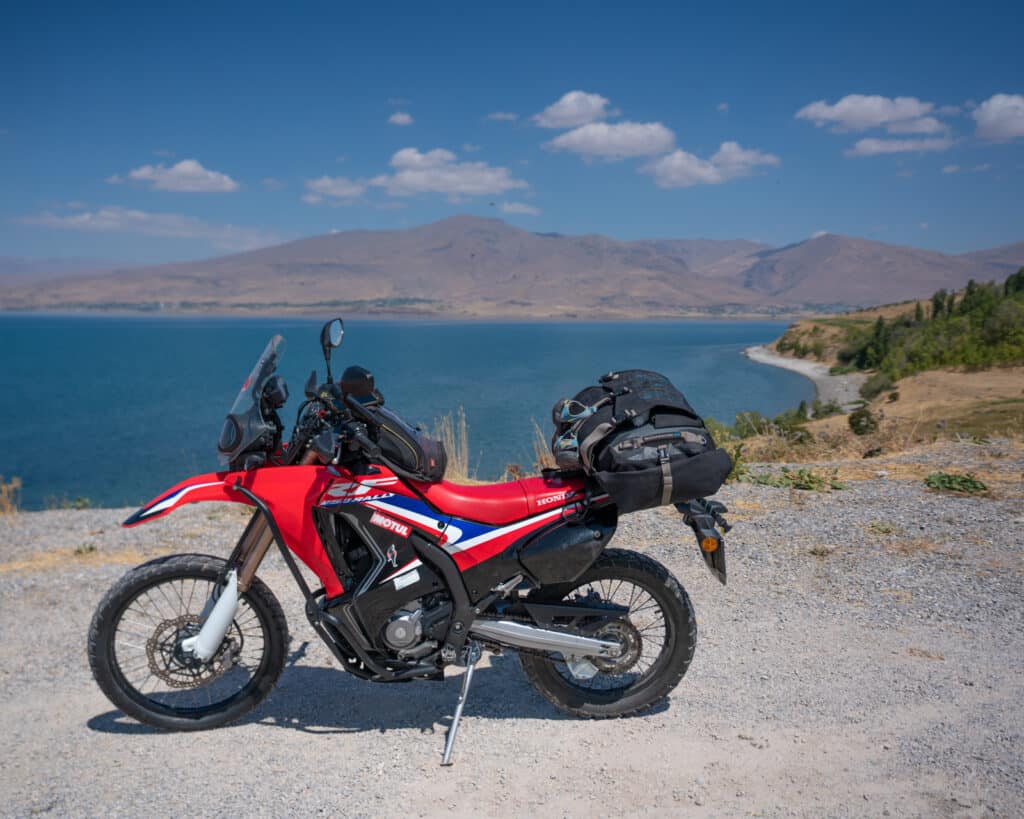
My rental motorcycle from Antalya
Renting a motorcycle in Turkey
If you don’t want to ride your own motorcycle to Turkey, it’s possible to rent a motorcycle once you’re in the country. Motorcycle rental can be relatively expensive as import duties are high in Turkey.
If you decide to rent a motorcycle in Turkey. Istanbul and Antalya are your best options for renting in terms of options and availability. I rented a motorcycle in Antalya twice, though the company I rented from is now closing up shop. Outside of those big cities, you’re unlikely to find anything except scooter rentals on offer.
To get a good idea of current pricing, Riderly.com has a handful of motorcycles listed with prices in both cities. Motorcycle Rental Turkey is another well-reputed option for motorcycle rentals in Istanbul.
Petrol and fuel stations in Turkey
Petrol stations (gas stations) are plentiful in Turkey. That’s not to say they’re all good quality… but, well, the quantity!
Most petrol stations are full service: an attendant will fill your tank, and then you pay for whatever fuel you consume. Most petrol stations across the country accept cards, including foreign credit cards. If paying by card, you simply pay inside the shop at the counter once you’re done. If paying by cash, you can pay the attendant.
Expect to pay a bit less than European prices for fuel—fuel isn’t cheap in Turkey like it is in its oil-rich neighboring countries!
Be wary of the fact that not all petrol stations are made equal; some have better quality petrol than others. I was told that Opet has the best quality fuel. BP was another suggestion, though I believe Petrol Ofisi bought them out. Generally, try to stop at stations with some traffic, rather than lonely, tired-looking stations in the middle of nowhere. Or, ride a crap old carbureted bike like me and don’t panic as much about dirty fuel!
HGS tags for toll roads in Turkey
In much of Turkey, toll roads are automated. You need to have an HGS sticker on your motorcycle that will be read electronically at toll booths.
Finding these stickers is a bit of an issue unless you’re near a big city or buy yours near the border. You can find them at some Shell petrol stations and PTT Turkish post offices. The sticker itself is 5TL, and you then need to top it up with money for tolls. You can set it to automatically top up, and you can check your balance and top up your tag online on the HGS website here. (Website, as like most Turkish sites, is all in Turkish – use a translator)
If you pass through a toll booth without an HGS sticker, you’ll be fined. If you get a sticker within the next 15 days to pay the toll amount, however, your fine will be canceled. Fines increase after non-payment for 15 days.
Disclaimer: To be honest, I have never actually used an HGS tag during all of my motorcycle travels in Turkey. I didn’t know I needed one for the first few visits. Once I learned I needed one, I couldn’t find them anywhere! Despite this, I never actually received a fine after driving through multiple toll booths. I’m not sure the toll booths can read motorcycle plates at all, to be honest.
Up to you if you want to play with the law or not.
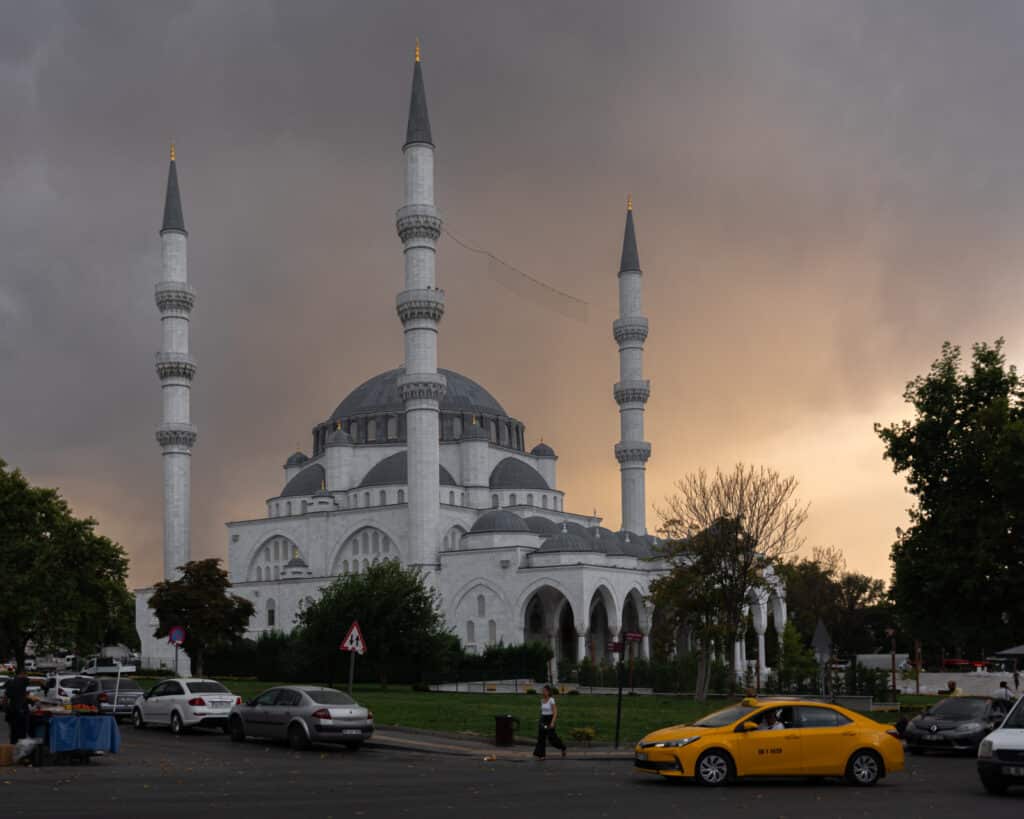
Ride carefully in places like Ankara, where infrastructure is up-to-date and cameras are more prevalent
Speed limits, cameras, and traffic fines in Turkey
Turkey is a bit strange with its speed limits. Technically, motorcycles have a lower speed limit than cars. Speed limits for motorcycles in Turkey are:
- Inside built-up areas: 50 km
- Outside built-up areas:
- Intercity roads: 80 km
- Divided highways: 90 km
- Motorways/toll roads: 100 km
That being said, do I think these are strictly enforced on foreign motorcycles? No, not really. I was following car speed limits for months and wasn’t flashed by any cameras when doing so. Who knows what the actual limits are?
Speed cameras in Turkey are present, though, especially near the big cities. If you see Turkish drivers slowing down for them, do the same! You can be fined with a foreign motorcycle; you pay any fines you’ve accrued at the border when leaving. Note that fines increase if not paid in 15 days; you can check to see if you’ve received any fines on this government website.
Motorcycle gear in Turkey: laws and requirements
While in Turkey, most of the riders you’ll see probably won’t be sporting helmets. However, some of the bigger cities like Istanbul and Antalya are becoming more strict about helmet use while riding. No one is likely to care outside the big cities, but you at least need to wear a helmet when riding in the city.
Other than that, there aren’t any clear requirements for other safety gear while riding in Turkey. Of course, I still recommend dressing for the slide, not the ride. Wear your safety gear, y’all!
Finding motorcycle mechanics and spare parts in Turkey
If you have bike issues on the road, Turkey can be both a blessing and a bane. Most towns and cities have motorcycle workshops (called “garaj”), and labor is relatively cheap in Turkey. You can find decent oil brands such as MOTUL if you look in the cities.
The downside is that authentic, imported parts can be hard to find/expensive… but, again, not all is lost: Turkish mechanics can get many things made to order.
An example story: I needed a new chain and sprocket set for my Suzuki DR650 while in Turkey, and Enduromarket had many of the things I needed. However, they ended up sending me the wrong-sized sprocket. Rather than wait for them to send a new one, the mechanic suggested I get one custom-made at a metal shop nearby. It was 2/3 the price, perfectly functional, and took only one day to reach me! Turkish magic, I suppose.
If you need to find a mechanic near you, Google Maps or iOverlander is sure to have a suggestion for you. I personally had a lot of work done by the couple running MotoAdv in Antalya, and can happily recommend them.
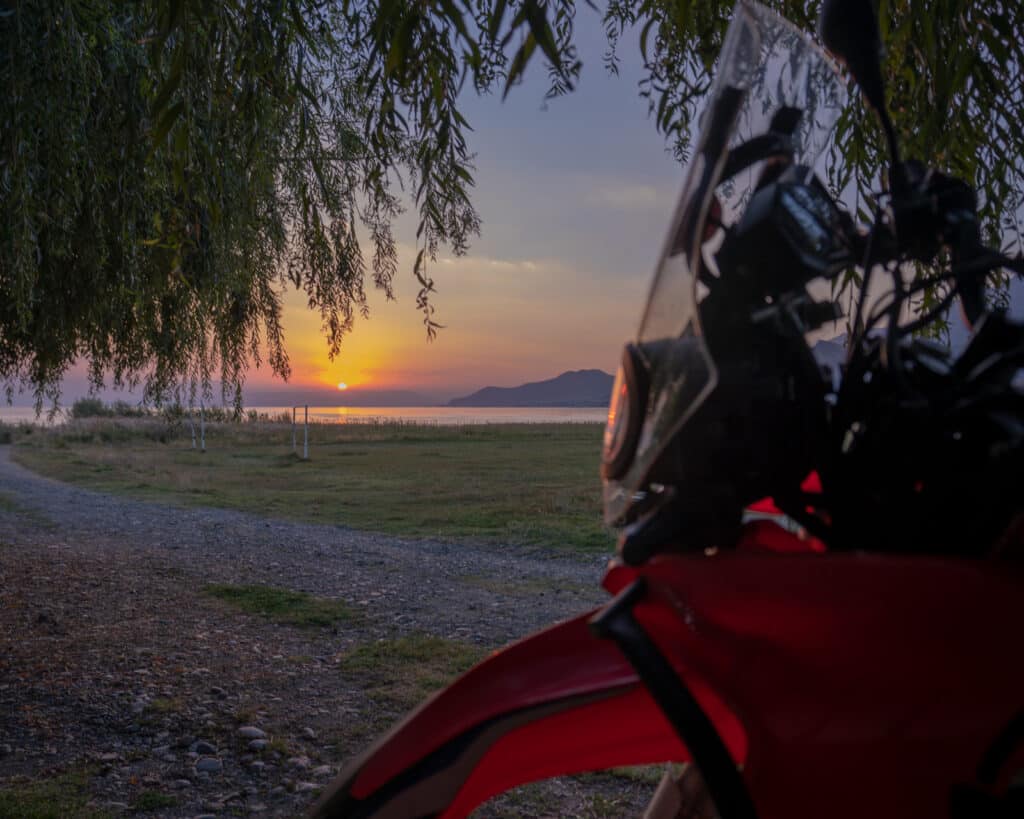
An organized camp site on the shores of Lake Van
Finding places to stay with your motorcycle in Turkey
Now the most finicky part of motorcycle travel in Turkey: finding a safe place to stay for you and your motorcycle!
Finding hotels in Turkey isn’t too difficult. There are a plethora of Turkish hotel websites, and some foreign websites such as Airbnb, Expedia, and Hotels.com work. The only hiccup is that Booking.com is banned in Turkey… but it’s accessible if you use a VPN.
Safe parking for the motorcycle is another story. There were very few places in Turkey where people said it was safe to leave a motorcycle parked on the street unless I was in a small village. Sometimes, I had to park my motorcycle in a paid, gated garage nearby. Often, I would leave it on the street directly in front of the hotel, covered so no one could easily access my bags. I don’t know if it was luck or not, but I didn’t have any issues with theft. However, that’s no guarantee.
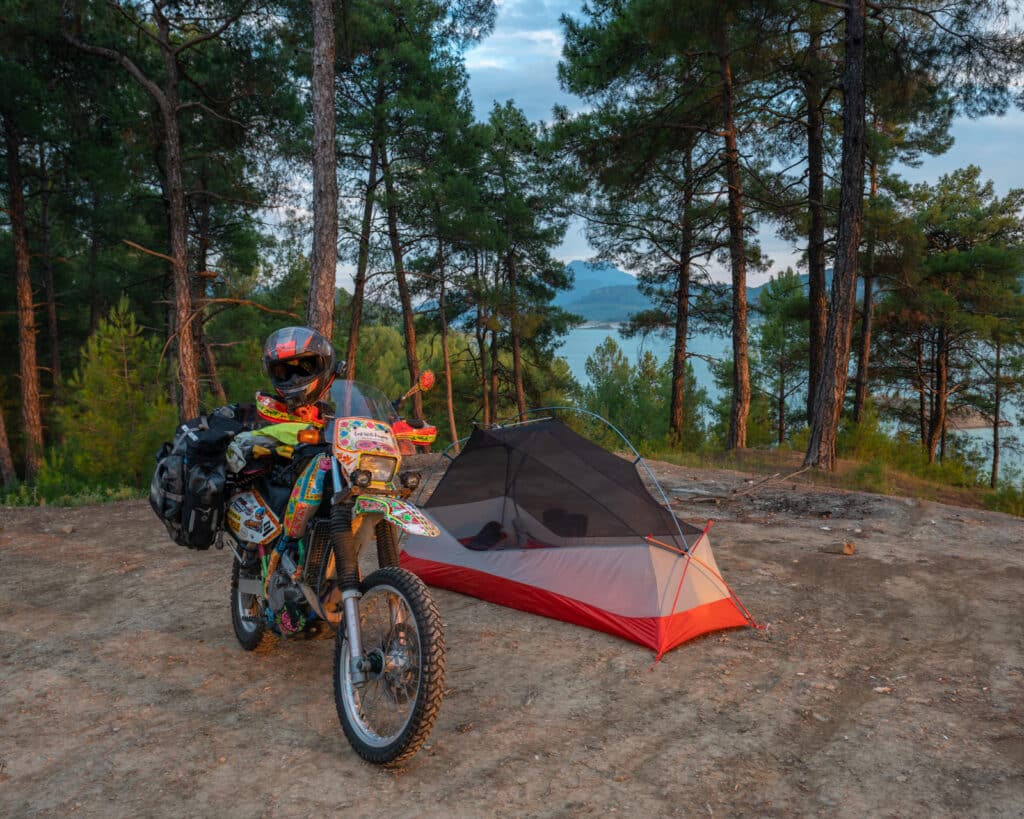
Motorcycle camping in Turkey: a true delight!
Motorcycle camping in Turkey (Türkiye)
Guesthouses are fine, but wild camping is my favorite way to ensure my bike is safe at night! Yes, wild camping is legal in Turkey. Wild camping—camping in nature, not at a campsite—is actually encouraged in most places in Turkey. I wild camped in loads of different places across the country, and didn’t have any issues or unwanted visitors.
Apps iOverlander and park4night are both great resources for finding nice motorcycle camping spots in Turkey.
When camping, please make sure to leave your campsite cleaner than it was when you found it! It’s easy to pick up a bit of trash on your way out, and dumpsters are easy to find. Littering is a huge issue in Turkey, and tourists should not exacerbate it.
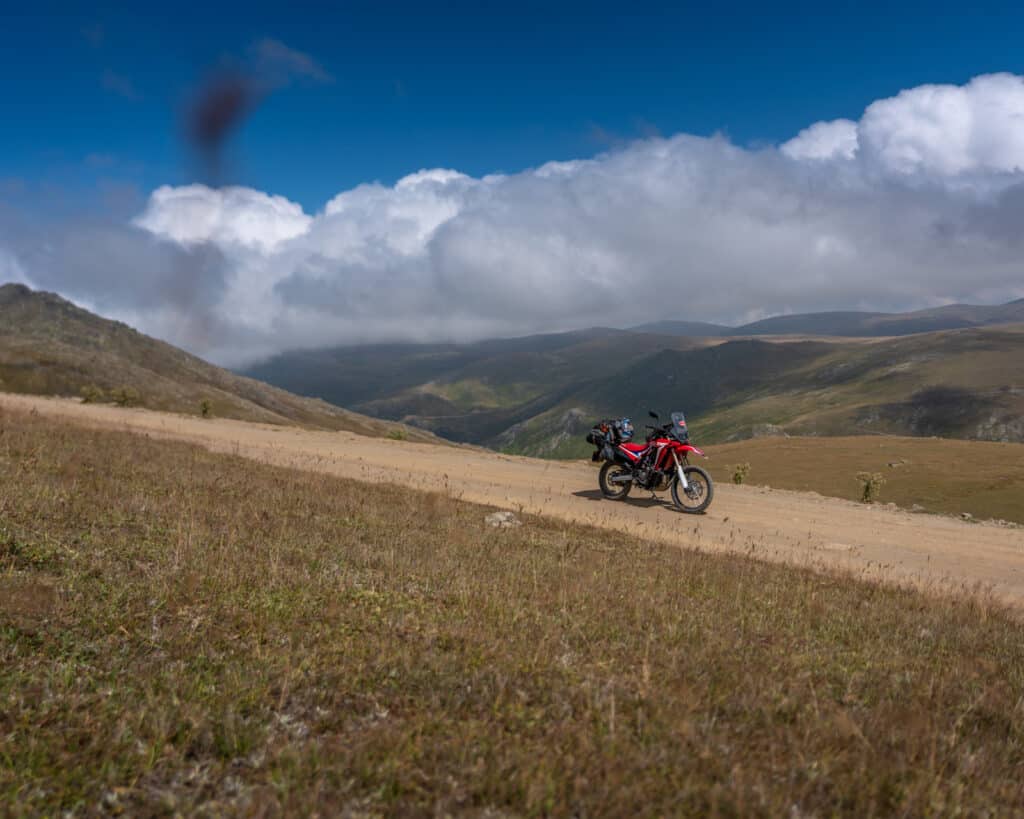
One of the many roads of the TET Turkey
TET Turkey and other offroad riding in Turkey
Love offroad? You’re going to love Türkiye.
Turkey has endless dirt roads and tracks all over the country, and it’s no problem at all to zip up and down random trails; there are no laws against it. Your only opponents are angry sheep dogs protecting their flocks.
It’s possible to simply turn onto any road that suits your fancy and see where it takes you… but if you want something more structured, you can ride the TET Turkey (Trans Euro Trail). It’s a network of mostly offroad trails all over Turkey, taking you through some spectacular scenery. I rode some of the TET in the highlands of Rize and in the mountains near Adana—both were a delight, neither were overly technical. As a biker of middling offroad skills, I had no issues. Another biker I know rode the entirety of the Turkish TET, and said that none of it was particularly difficult as compared to other countries.
As always, ride within your limits. If going offroad, go with someone, or ride cautiously; it’s not always easy to call for help in the middle of nowhere!
Emergency numbers for Turkey
In the unfortunate event that you DO get into an accident while riding in Turkey, make sure to save these numbers:
- 112: Ambulance/emergency medical
- 155: Police
- 156: Jandarma, the rural police
- 110: Fire
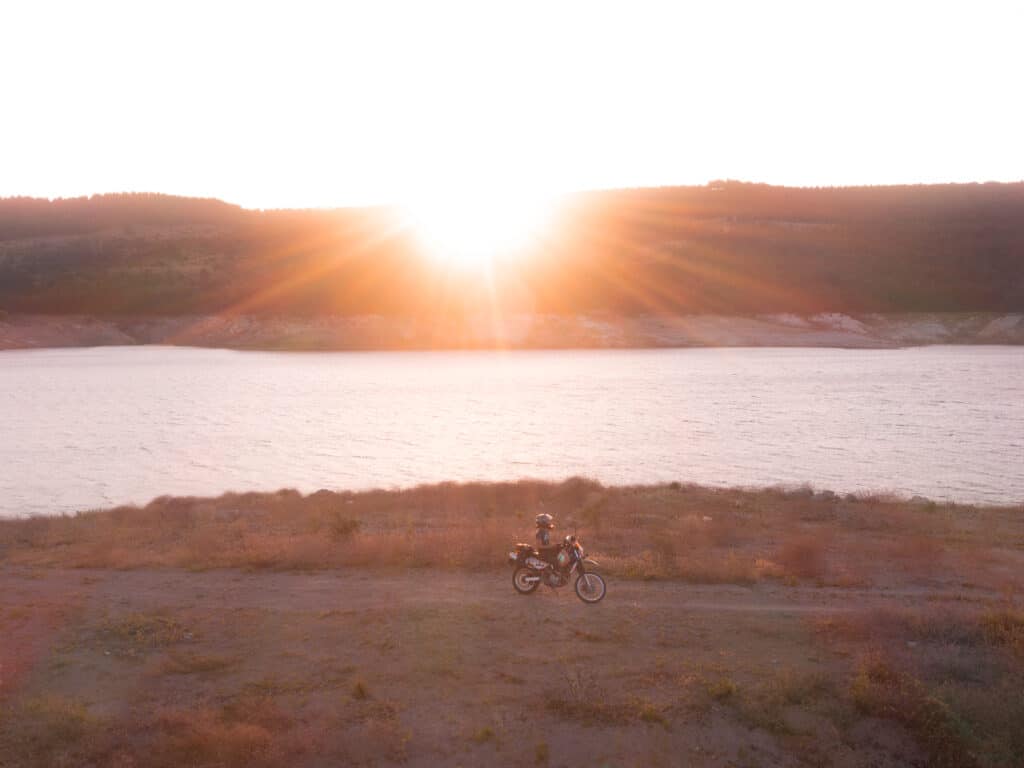
Now you’re ready for motorcycle travel in Turkey! (I think. I hope.)
More resources for motorcycle travel in Turkey (Türkiye)
- iOverlander: My favorite app for getting information on camping sites, border crossings, and accommodation with safe parking for motorcycles.
- Park4night: An app geared towards overlanders with camper vans, but nevertheless useful for finding wild camping spots.
- Horizons Unlimited: My go-to Facebook group for any questions regarding motorcycle travel around the world. There’s plenty of Turkish bikers in the group, too.
- Overlanding Turkey: A Facebook group for people traveling with their own vehicles in Türkiye
- All my blog posts about Turkey are here – don’t miss them!
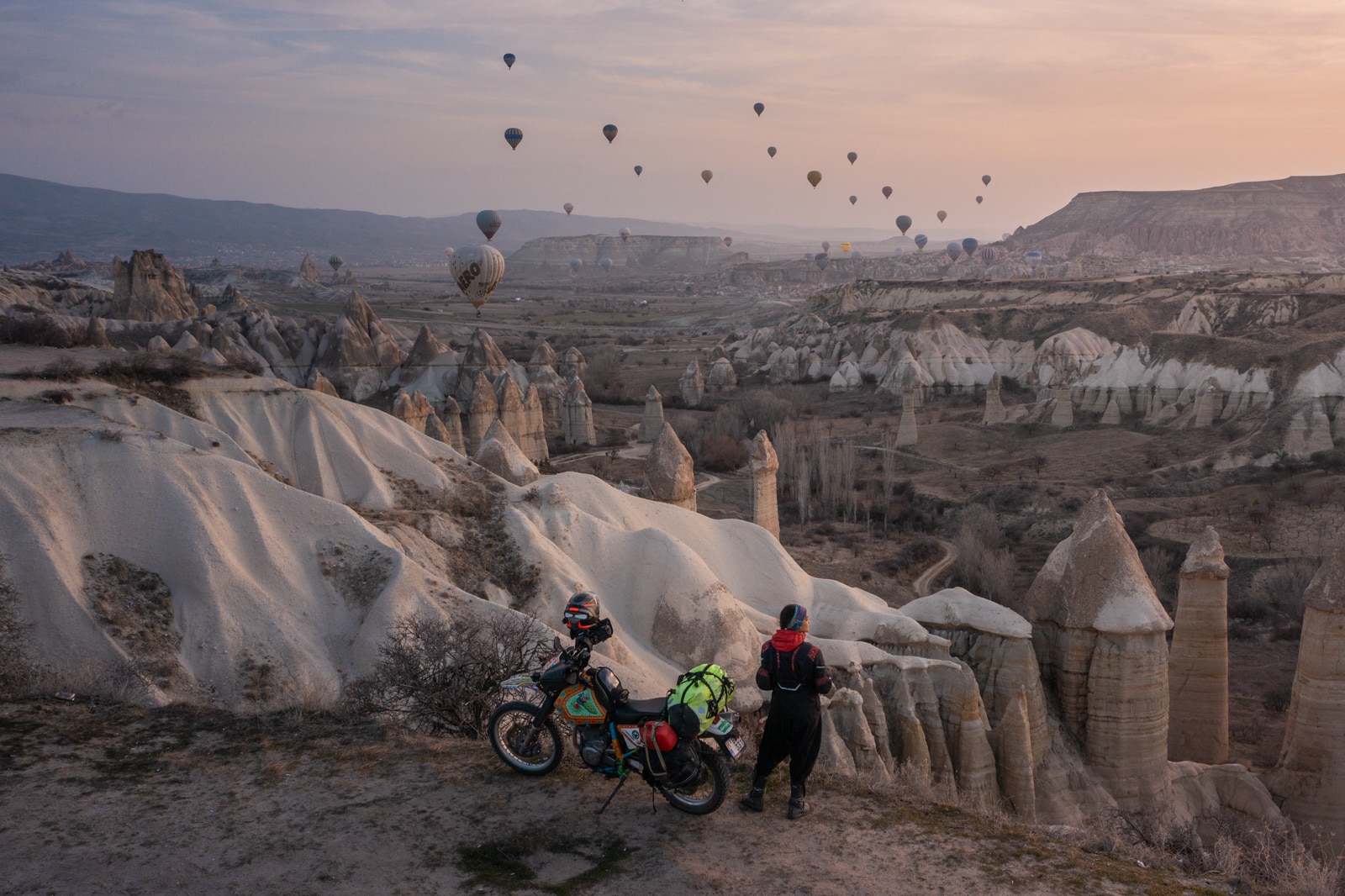


Thanks very much for the information, advice and links.
This is some nice stuff. It took me a while to find this web page but it was worth the
time. I noticed this post was hidden in yahoo and not the number one spot.
This web page has a ton of enjoyable stuff and it does not deserve to be burried in the search engines like that.
By the way Im going to save this webpage to my list
of favorites.
The level of my admiration for your work mirrors your own sentiment. The sketch is elegant, and the authored material is stylish. Nevertheless, you appear concerned about the prospect of embarking on something that may be seen as dubious. I agree that you’ll be able to address this issue promptly.
Excellent post. I’m an American living in Colombia and want to ride around Eastern Europe and Turkey. Is it worth to ship my moto or just buy a used moto there for $8-10k, then resell it? I’d have to get bags and everything too…
Great article, I’ve been all over Turkey.. but on coach or car so motorcycle will be a new adventure… I plan to travel down in September and leave bike until March in friends garage… I’m hoping no extra fines or charges when I exit…
Will read your article and advice again.
Thanks